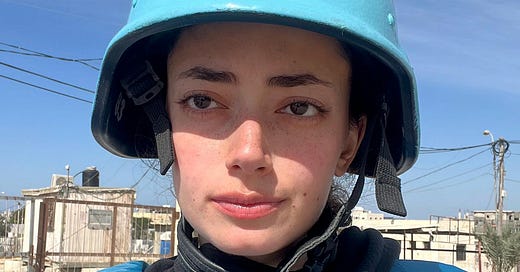Hi,
you are reading Understanding TikTok. My name is Marcus. I am an Internet researcher at HAW Hamburg, investigating TikTok and propaganda. Due to the grim situation in the Middle East here is another special edition.
💥 Israel-Hamas War Update
🎭 Pallywood – Crisis Actor Conspiracy Theories
📹 Warfluencers: Valeria & Plestia
💥 Israel-Hamas War Update
The deluge of online propaganda and disinformation is larger than anything seen before, according to government officials and independent researchers, writes the NYT (Nov, 3) with detailed influence campaigns not only by the conflict parties but by Iran, Russia and China. I wrote about the polluted information environment in #111: Information Disorder and shared some observations on WarTok II in #112.
While TikTok denies failing to protect Jewish users (The Jewish Chronicle) the Digital Forensic Research Lab (DFRLab) at the Atlantic Council has identified accounts on Facebook and TikTok spreading an ISIS call for violence against Jewish targets.
🎭 Pallywood – Crisis Actor Conspiracy Theories
Pro-Israeli accounts are accusing Palestinians of using crisis actors to fake their suffering in order to elicit online sympathy (Euronews). Palestinians are being falsely accused of engaging in "Pallywood" (the hashtag currently has 5,6 M views on TikTok) and staging the horrors they’re experiencing in Gaza (Rolling Stone).
“Pallywood” is a derogatory amalgamation of the words “Palestine” and “Hollywood,” and has been used in the past to accuse Palestinians of staging or play-acting scenes of violence and repression in order to engineer public sympathy for their cause.
Videos containing debunked information have been shared among others by official Israeli social media accounts as well as German media outlet Die Welt according to Matt Binder.
Crisis Actors conspiracies aim to undermine the “credebility of the victims and create enough confusion and doubt that real images of violence are being dismissed” says Abbie Richards: “They exist to train you not to believe your own eyes.” There have been unfounded claims about CNN using crisis actors as well (Poynters).
📹 Warfluencers: Valeria & Plestia
Especially on TikTok individual creators play an important role in framing war narratives. After the Russian invasion it was e.g. Ukrainian user Valeria Shashenok (Mashable) who managed to give a witty tiktokable yet brutal insight from an authentic eye witness perspective “capturing hearts” on TikTok and traditional media in the West resulting in getting invited to amongst other places the European Parliament (Euronews).
The account of 22 year old Palestinian Plestia Alaqad is a similar yet different case. Just like Valeria Plestia has been documenting her life (as a dog mum) on TikTok and Instagram before the 2023 Israeli invasion of the Gaza Strip. Unlike Valeria who wanted to become a fashion photographer, Plestia wanted to become a journalist as her LinkedIn profile indicates.
Just like Valeria Plestia changed the content she uploaded to TikTok and Insta from one day to the next with many western media houses reporting her story ('Don't Know How I Made It Out Alive'). The differences between these two cases (and this word feels terrible wrong because these two woman are human beings in unimaginable dangerous and stressful situations) are worth observing:
👉 Plestia got news coverage faster, probably due to the fact that she is has more reach on Instagram the medium of choice for many millenial journalists. It took some time for journalists to discover Valeria.
👉 Unlike Valeria, who remained “the girl from Ukraine” Plestia was quickly seen with a press-vest indicating that her voice was not the voice of an “ordinary user” but a journalist. That made it easier to reach Western journalists and get press coverage but not necessarily increased her relatability as a “real” creator “like you and me” for some users.
👉 While Valeria most of the time kept a light-tone utilizing TikTok platformspecifics like trending sounds and challenges turning her war reports into subtle and relatable statements Plestia rather sticks to documenting in a journalistic manner. This tells us much about the constraints of the platforms forcing creators to perform for reach.
👉 The Jerusalem Post quickly dismissed Plestia as “part of Hamas’s propganada team”. An indication of the perceived relevance of individual creators and part of the ongoing information warfare. Neither of her accounts, nor her Linkedin bio including attendance of the American International School of Gaza High School where she participated in the Albert Schwitzer for Life Leadership Program in Ireland at this point suggest any connections to Hamas.
Unlike with Valeria who – at least in my observation – was entirely seen as authentic source in the West, the information landscape concerning Israel-Hamas is more twisted often without a shared common ground of fact-based evidence. Plestia just like Valeria seems very real. “I am devastated. I ran out of words to describe how I’m feeling or what’s happening”, she posts. And we should pay attention.
What else
Amnesty International has published two reports –Driven into the Darkness: How TikTok Encourages Self-harm and Suicidal Ideation and the I Feel Exposed: Caught in TikTok’s Surveillance Web. They “highlight the abuses experienced by children and young people using TikTok, and the ways in which these abuses are caused by TikTok’s recommender system and the underlying business model” and were produced in partnership with the Algorithmic Transparency Institute and AI Forensic. I would love to see more cross-platform research on that given the fact that all AI based recommender systems risk to amplify similar harming content.
🍎 Democrats consider how TikTok may fit into their 2024 campaign strategy (NPR)
🍎 How this Canadian radio show became a TikTok hit (Nieman)
🍎 Generative AI Is Playing a Surprising Role in Israel-Hamas Disinformation (Wired)
🍎 Greece’s New Political Star Is a TikTok Creation (Wired)
Thanks for reading. Speak soon. Ciao.
* As stated above “Pallywood” is a derogatory amalgamation of the words “Palestine” and “Hollywood” while Warfluencer just like WarTok can help to pin down a certain yet way more complex phenomenon.






